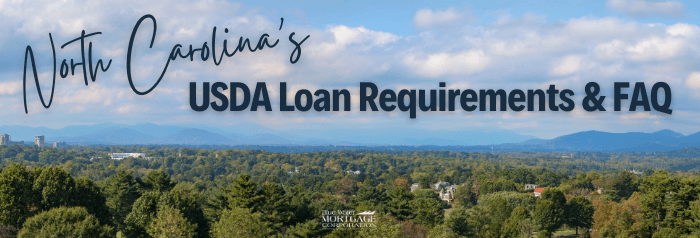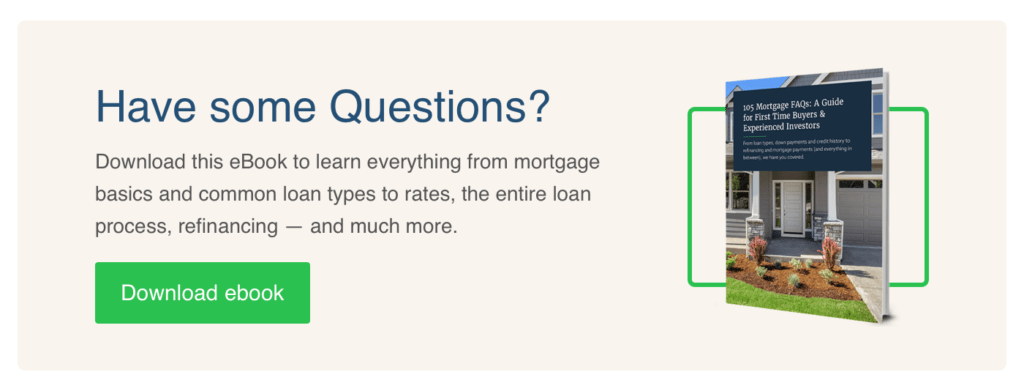

Dreaming of a home in an area with warm weather, a thriving job market and awe-inspiring landscapes? Look no further – North Carolina is one of the most beautiful places to call home, and with the USDA home loan program, you could be one step closer to affordably living in the Tar Heel State.
USDA loans are supplied by the U.S. Department of Agriculture via the USDA Rural Development Guaranteed Housing Loan Program. With 100 percent financing, no down payment required and low mortgage insurance rates, USDA loans have become an increasingly popular option for home buyers.
At Blue Water, we serve to ensure you have the information you need to choose the best mortgage option for you. Read on to learn more about USDA loans requirements in North Carolina.
There are three types of USDA loans available to NC residents:
USDA loans are more affordable than other loan types. Unlike conventional and FHA loans, USDA loans offer 100 percent financing with no down payment required. USDA borrowers pay very low mortgage insurance rate (MI) of .4%, which is less than half the cost of an FHA loan’s monthly mortgage insurance fee. USDA loans are very straightforward, with no prepayment penalties or hidden fees.
Although USDA loans are stricter than most other loan types due to their eligibility requirements, they are no more difficult to meet than for any other type of loan. The most important requirements are income and property eligibility.
As luck would have it, there are a number of rural areas in North Carolina that may qualify for USDA loan property eligibility. Areas that are not eligible are typically located around the major cities such as Charlotte and Raleigh. To see which areas are eligible for a USDA loan in NC, you can refer to the USDA’s mapping tool.
The USDA income limit is based on the sum of income of all household members over the age of 18, regardless of whether their name is on the loan. To qualify, the gross household income must be less than 115% of the county’s median income.
In North Carolina, there are a few basic requirements you must meet in order to be eligible for a USDA loan.

The USDA home loan program has strict income eligibility restrictions, with income limits varying from state to state from county to county. Income caps for a guaranteed loan in the state of North Carolina are shown in the chart below.
| 1-4 Person Household | 5-8 Person Household | |
| Alleghany County, NC | $110,650 | $146,050 |
| Anson County, NC | $110,650 | $146,050 |
| Ashe County, NC | $110,650 | $146,050 |
| Asheville, NC HUD Metro FMR Area | $110,650 | $146,050 |
| Avery County, NC | $110,650 | $146,050 |
| Beaufort County, NC | $110,650 | $146,050 |
| Bertie County, NC | $110,650 | $146,050 |
| Bladen County, NC | $110,650 | $146,050 |
| Brunswick County, NC HUD Metro FMR Area | $110,650 | $146,050 |
| Burlington, NC MSA | $110,650 | $146,050 |
| Camden County, NC | $110,650 | $146,050 |
| Carteret County, NC | $110,650 | $146,050 |
| Caswell County, NC | $110,650 | $146,050 |
| Charlotte-Concord-Gastonia, NC-SC HUD Metro FMR Area | $114,650 | $151,350 |
| Cherokee County, NC | $110,650 | $146,050 |
| Chowan County, NC | $110,650 | $146,050 |
| Clay County, NC | $110,650 | $146,050 |
| Cleveland County, NC | $110,650 | $146,050 |
| Columbus County, NC | $110,650 | $146,050 |
| Craven County, NC HUD Metro FMR Area | $110,650 | $146,050 |
| Dare County, NC | $110,650 | $146,050 |
| Davidson County, NC HUD Metro FMR Area | $110,650 | $146,050 |
| Duplin County, NC | $110,650 | $146,050 |
| Durham-Chapel Hill, NC HUD Metro FMR Area | $116,300 | $153,500 |
| Fayetteville, NC HUD Metro FMR Area | $110,650 | $146,050 |
| Gates County, NC HUD Metro FMR Area | $110,650 | $146,050 |
| Goldsboro, NC MSA | $110,650 | $146,050 |
| Graham County, NC | $110,650 | $146,050 |
| Granville County, NC | $110,650 | $146,050 |
| Greene County, NC | $110,650 | $146,050 |
| Greensboro-High Point, NC HUD Metro FMR Area | $110,650 | $146,050 |
| Greenville, NC MSA | $110,650 | $146,050 |
| Halifax County, NC | $110,650 | $146,050 |
| Harnett County, NC | $110,650 | $146,050 |
| Haywood County, NC HUD Metro FMR Area | $110,650 | $146,050 |
| Hertford County, NC | $110,650 | $146,050 |
| Hickory-Lenoir-Morganton, NC MSA | $110,650 | $146,050 |
| Hoke County, NC HUD Metro FMR Area | $110,650 | $146,050 |
| Hyde County, NC | $110,650 | $146,050 |
| Iredell County, NC HUD Metro FMR Area | $110,650 | $146,050 |
| Jackson County, NC | $110,650 | $146,050 |
| Jacksonville, NC MSA | $110,650 | $146,050 |
| Jones County, NC HUD Metro FMR Area | $110,650 | $146,050 |
| Lee County, NC | $110,650 | $146,050 |
| Lenoir County, NC | $110,650 | $146,050 |
| Lincoln County, NC HUD Metro FMR Area | $110,650 | $146,050 |
| Macon County, NC | $110,650 | $146,050 |
| Martin County, NC | $110,650 | $146,050 |
| McDowell County, NC | $110,650 | $146,050 |
| Mitchell County, NC | $110,650 | $146,050 |
| Montgomery County, NC | $110,650 | $146,050 |
| Moore County, NC | $110,650 | $146,050 |
| Northampton County, NC | $110,650 | $146,050 |
| Pamlico County, NC HUD Metro FMR Area | $110,650 | $146,050 |
| Pasquotank County, NC | $110,650 | $146,050 |
| Pender County, NC HUD Metro FMR Area | $110,650 | $146,050 |
| Perquimans County, NC | $110,650 | $146,050 |
| Person County, NC HUD Metro FMR Area | $110,650 | $146,050 |
| Polk County, NC | $110,650 | $146,050 |
| Raleigh, NC MSA | $130,300 | $172,000 |
| Richmond County, NC | $110,650 | $146,050 |
| Robeson County, NC | $110,650 | $146,050 |
| Rockingham County, NC HUD Metro FMR Area | $110,650 | $146,050 |
| Rocky Mount, NC MSA | $110,650 | $146,050 |
| Rowan County, NC HUD Metro FMR Area | $110,650 | $146,050 |
| Rutherford County, NC | $110,650 | $146,050 |
| Sampson County, NC | $110,650 | $146,050 |
| Scotland County, NC | $110,650 | $146,050 |
| Stanly County, NC | $110,650 | $146,050 |
| Surry County, NC | $110,650 | $146,050 |
| Swain County, NC | $110,650 | $146,050 |
| Transylvania County, NC | $110,650 | $146,050 |
| Tyrrell County, NC | $110,650 | $146,050 |
| Vance County, NC | $110,650 | $146,050 |
| Virginia Beach-Norfolk-Newport News, VA-NC HUD Metro FMR Are | $113,850 | $150,300 |
| Warren County, NC | $110,650 | $146,050 |
| Washington County, NC | $110,650 | $146,050 |
| Watauga County, NC | $110,650 | $146,050 |
| Wilkes County, NC | $110,650 | $146,050 |
| Wilmington, NC HUD Metro FMR Area | $110,650 | $146,050 |
| Wilson County, NC | $110,650 | $146,050 |
| Winston-Salem, NC HUD Metro FMR Area | $110,650 | $146,050 |
| Yancey County, NC | $110,650 | $146,050 |
What are some of the benefits of applying for a USDA loan?
The most notable benefits are 100% financing, fixed affordable interest rates, low monthly mortgage insurance and flexible credit guidelines.
I don’t live in a rural area – can I still qualify for a USDA loan?
Common belief is that USDA loans are reserved strictly for farms or homes in rural areas – not always! Many homes in suburbs outside small towns (and even some major cities) also qualify.
Do I need to be a first-time home buyer to use a USDA loan?
No, so long as you meet all other USDA qualifications and only own one home that meets the USDA’s definition of “adequate property” at a time.
How does the USDA define “adequate property”?
If you already own a home and intend to retain that property, you are still eligible for a guaranteed loan to purchase another home if you meet the following criteria:
Is there an occupancy requirement for a USDA loan?
Yes. To qualify for a USDA home loan, you must establish the property as your full-time, permanent residence.
What does the USDA loan application process look like?
At Blue Water we recognize that every borrower is unique, so your USDA application process might look a little different. Reach out today – we look forward to listening and learning about your needs as you go through this journey.
What is a mortgage broker and how can they help me apply for a USDA loan in NC?
A mortgage broker acts as an intermediary between the borrower and the lender. A good broker will review your finances to determine which lender best fits your individual situation and will represent you throughout the loan application process to ensure you receive favorable terms.
Are co-borrowers allowed on a USDA loan?
Yes. There can be up to four co-borrowers on a single USDA loan transaction.
How much do I have to put down on a USDA loan?
USDA loan terms include 100% financing, which means you pay zero money down. However, you will be responsible for closing costs unless the seller agrees to pay a percentage or all of the closing costs.
Are there any upfront costs with a USDA loan?
If you intend to apply for a USDA guaranteed loan, you’ll have to pay an upfront guarantee fee and a set annual fee.
The guarantee fee is charged by mortgage-backed securities providers, such as Freddie Mac and Fannie Mae, and is typically added to your initial loan amount. The annual fee is paid as part of your monthly mortgage payment and varies from year to year based on the average amount of outstanding principal for the loan.
As of October 1, 2016, both fees were drastically reduced, saving qualified borrowers up to thousands of dollars.
Will I be able to refinance a USDA loan?
Yes. The three types of USDA loan refinancing are USDA Streamline Refinance, USDA Streamline-Assist Refinance and Non-Streamline Refinance.
Streamline refinance enables homeowners currently on their USDA loan for at least 12 months to refinance without a new appraisal.
Streamline-assist refinance is most popular of USDA refinancing options and does not require a new appraisal, credit checks or DTI ratio calculations.
The non-streamline refinance option is similar to the streamline option; however, borrowers are required to get a new appraisal.
USDA Credit Requirements
There’s no minimum credit requirement for the USDA loan, however, borrowers with a credit score of 640 or higher are eligible for streamline processing. USDA loans are more forgiving of poor credit than most other loan products on the market. Most USDA-approved lenders require a minimum FICO score of 620 and a standard debt-to-income (DTI) ratio of 29%/41%.
Borrowers with a credit score lower than 640 are still eligible to receive a USDA loan, though they will be subject to the standard underwriting process. The lender will assess the length of your credit history, your repayment patterns, your credit utilization and your credit score to determine your credit worthiness. If you have a nontraditional or no credit history, lenders will evaluate your eligibility on a case-by-case basis.
No Set Loan Limits
Since USDA loans are intended for lower-income areas with lower property values, the USDA does not set loan limits. Rather, it evaluates borrowers on an individual basis to determine their maximum loan amount. Maximum loan amounts are based on factors such as your DTI ratio, monthly income, assets, credit score or mortgage payment history and the value of the property.
Ways to Use a USDA Loan:

If you have any additional questions about USDA loans in North Carolina or want to find out if you qualify, talk to one of our experienced mortgage brokers today. Our team has 150 years of combined experience helping clients find the best mortgage solution for their unique needs.
Roger is an owner and licensed Loan Officer at Blue Water Mortgage. He graduated from the University of New Hampshire’s Whittemore School of Business and has been a leader in the mortgage industry for over 20 years. Roger has personally originated over 2500 residential loans and is considered to be in the top 1% of NH Loan Officers by leading national lender United Wholesale Mortgage.
Company NMLS 1291, CO Lender License #1291, CT License #MCL-1291, GA License #1291, FL License #MLD1631, MA Lender & Broker License #MC1291, MD Lender License #1291, ME License #1291, NC License #L-189893, NH License #8833-MB, RI Lender License 20224503LL, RI Broker License 20224504LB, SC DCA Broker License #1291, TX #1291 - DBA Blue Water Home Finance, LLC, VT Lender License #LL-1291, VT Broker License #MB-1291
© Copyright 2024 Blue Water Mortgage, LLC